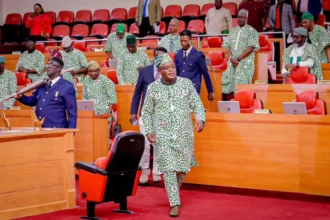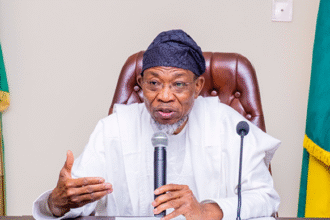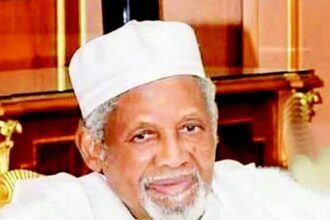...To get all news updates, Join our WhatsApp Group (Click Here)
Also Join our WhatsApp Channel (Click Here)
Heritage Bank Plc has reiterated its commitment to further deepen the drive to support agribusiness value chain in order to fast track food security and sufficiency in the country.
The MD/CEO of the bank, Mr Ifie Sekibo, who disclosed this, stated that in a bid to support food sufficiency, Heritage Bank would not relent in boosting the agric base of the nation and; making farming profitable to stakeholders and attractive to the youth.
Specifically, he affirmed that the bank would focus in supporting the agric space via financing farmers to purchase modern technology; as the funding will bring about transformative development in the sector.
According to him, the bank would support the drive for cash crop commodities that would boost Nigeria’s foreign exchange earnings, which the President Muhammadu Buhari’s administration has always been cautious given the dangers the continuous reliance on imported food items pose to its efforts to create jobs as well as develop and diversify the economy.
The bank’s Group Head, Agriculture Finance, Mr Olugbenga Awe, also disclosed that Heritage Bank is committed to the development of agribusiness and small and medium enterprises (SMEs).
“Our support cuts across the entire value chain with focus on large corporates and small holder farmers. We encourage value addition and ultimately export,” he said.
He, however, noted that the bank’s support goes beyond food sufficiency to increasing cash crop commodities that would boost Nigeria’s foreign exchange earnings.
He hinted that Heritage Bank is effectively tackling the bottlenecks since it has long identified the opportunities in agribusiness, thereby offering solutions to ease of doing business in the sector.
“For ease of financing, we would be better off with functional commodity exchanges as a country. We can start by refinancing commodities through a warehousing receipt systems, gradually we will move to crop receipt. With commodities exchange, the value-chain is strengthened and the whole system is structured. Exchange helps in reducing the long marketing chain, it helps in enforcement of commodity standards, it provides price certainty and in some cases storage and warehousing facilities,” Awe suggested.
He further noted, “if we sustain the current momentum on rice, we shall surely export rice in the nearest future, and the operative word here is sustaining the momentum. However, there is need for strategic alignment on objectives. The current focus by government is on small holders’ farmers using the instrumentality of the Anchor Borrowers Programme (ABP) by Central Bank of Nigeria.”
The Group Head, Agriculture Finance, said to hasten the export drive, commercial farmers will have to step in and drive the process using mechanization on thousands of hectares of farmland with vast irrigation networks and all year round farming as most importers need large quantities delivered on schedule.
Meanwhile, he noted that with the Heritage Bank strategic partnership, CBN had continued to provide lot of supports through various on-lending scheme, as ABP has made visible and measurable impact especially in rice, while hoping other commodities especially grains would follow.
Awe explained that via the strategic partnerships Heritage Bank have achieved vast footprints in agribusiness.
For example, through our partnership with Triton Aqua Africa Limited and on-lending support from CBN, Heritage Bank have provided N2billion for fishery to reduce our heavy reliance on fish import. Nigeria’s current annual demand for fish is estimated at 2.7million metric tonnes and we currently produces about 800,000metric tonnes. With support from CBN through Commercial Agriculture Credit Scheme CACS, Triton is now producing about 27,000metric tonnes and their projection is to reach 100,000 metric tonnes in five years. From recent forecast, they will meet that projection easily. The bank is also supporting rice farmers under the ABP in Bakolori, Zamfara, Sanga in Kaduna and Soyabeans farmers in Rijana, Kaduna. Heritage Bank also have ongoing projects across the country.
You can get every of our news as soon as they drop on WhatsApp ...To get all news updates, Join our WhatsApp Group (Click Here)
Also Join our WhatsApp Channel (Click Here)









